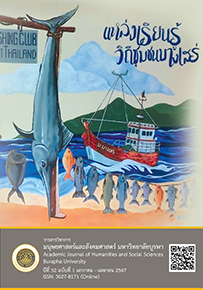Factors Influencing the Behavioral Intention to Follow the King’s Philosophy of the People
Main Article Content
Abstract
The objectives of this study were: 1) to study the relationship between the variables used in the study according to the theory of planned behavior and 2) to study the influence of attitudes on the approach of King’s philosophy. Amenable to reference groups’ Perceptions of the ability to control behavior that affects behavioral intentions by the lines of King’s philosophy. This research is quantitative, conducted by conducting survey research and collecting questionnaires from a sample group in Chiang Rai Province. The researcher used a random sampling method of 400 people.
The study’s results found that the variable with the highest relationship with behavior following King’s philosophy guidelines is conformity to the reference group (0.807). Furthermore, the attitude towards King’s philosophy approach (0.727) is at the statistical significance level of 0.01. Then, the results of the analysis of influences on behavioral intentions and compliance with the guidelines of the King’s Science. It found that gender, age, attitude, conformity to the reference group, and perceived ability to control behavior were factors that could together predict 71.80%.
Downloads
Article Details

This work is licensed under a Creative Commons Attribution-NonCommercial-NoDerivatives 4.0 International License.
บทความทุกบทความเป็นลิขสิทธิ์ของวารสารวิชาการมนุษยศาสตร์และสังคมศาสตร์ มหาวิทยาลัยบูรพาเท่านั้น
References
กาญจนา แก้วเทพ และนิคม ชัยขุนพล. (2555). คู่มือสื่อใหม่ศึกษา. ภาพพิมพ์.
คมชัดลึกออนไลน์. (2566). หัวใจไทยแผ่นดินเรา. https://www.komchadluek.net/kom-lifestyle/80756
ชลิตา ลชิตาวงศ์. (2551). พฤติกรรมและปัจจัยที่มีผลต่อการดำเนินชีวิตตามปรัชญาเศรษฐกิจพอเพียงของสมาชิกกลุ่มออมทรัพย์เพื่อการผลิต. [วิทยานิพนธ์ศิลปศาสตรมหาบัณฑิต, มหาวิทยาลัยเชียงใหม่].
ชวาลา ไชยฤทธิ์, ศรีวรรณ ยอดนิล และวรวุฒิ เพ็งพันธ์. (2561). การประยุกต์ใช้ศาสตร์พระราชาเพื่อการปฏิบัติงานชุมชนของสำนักงานส่งเสริมการศึกษานอกระบบและการศึกษาตามอัธยาศัยในเขตภาคตะวันออก. วารสารการศึกษาและการพัฒนาสังคม, 14(1), 186-195.
ปวริศ เมตตา. (2560). ความรู้และพฤติกรรมในการนำหลักปรัชญาของเศรษฐกิจพอเพียงมาใช้ในการดำเนินชีวิตของข้าราชการกรมการค้าภายใน กระทรวงพาณิชย์. [การค้นคว้าอิสระรัฐศาสนศาสตรมหาบัณฑิต, มหาวิทยาลัยสยาม].
ภัทรดนัย พิริยะธนภัทร. (2558). การศึกษาปัจจัยด้านประชากรศาสตร์ ด้านพฤติกรรมผู้บริโภคและปัจจัยด้านเว็บไซต์พระเครื่องพาณิชย์อิเล็กทรอนิกส์ที่มีผลต่อการตัดสินใจเช่าหรือประมูลพระเครื่องออนไลน์ (E-Commerce). [การค้นคว้าอิสระบริหารธุรกิจมหาบัณฑิต, มหาวิทยาลัยกรุงเทพ].
วงศกร เพิ่มผล. (2563). ปัจจัยที่เกี่ยวข้องกับความตั้งใจสืบสารพระราชปณิธาน ศาสตร์พระราชาในการดำเนินชีวิตของนักศึกษา มหาวิทยาลัยราชภัฏธนบุรี กรุงเทพมหานคร. [รายงานวิจัย]. มหาวิทยาลัยราชภัฏธนบุรี.
สิน พันธุ์พินิจ. (2554). เทคนิคการวิจัยทางสังคมศาสตร์. วิทยพัฒน์.
ศิริวรรณ เสรีรัตน์. (2550). พฤติกรรมผู้บริโภค. ธีระฟิล์มและไซเท็ก.
ห้องสมุดมั่นพัฒนา. (2561). แนวคิดเกี่ยวกับศาสตร์พระราชา. http://gened.cmru.ac.th/ebook/pdf/GSOC2205-01.pdf
Ajzen, I. (1991). The theory of planned behavior. Organizational Behavior and Human Decision Processes, 50(2), 179-211.
Ajzen, I., & Fishbein, M. (1980). Understanding attitudes and predicting social behavior. Prentice-Hall.
Bandura, A., Adams, N. E., Hardy, A. B., & Howells, G. N. (1980). Tests of the generality of self-efficacy theory. Cognitive Therapy and Research, 4, 39–66.
Engel, J. F., Blackwell, R. D., & Miniard, P. W. (1995). Consumer behavior (6thed.). Dryden Press.
Yamane, T. (1973). Statistics: An introductory analysis. Harper & Row.


